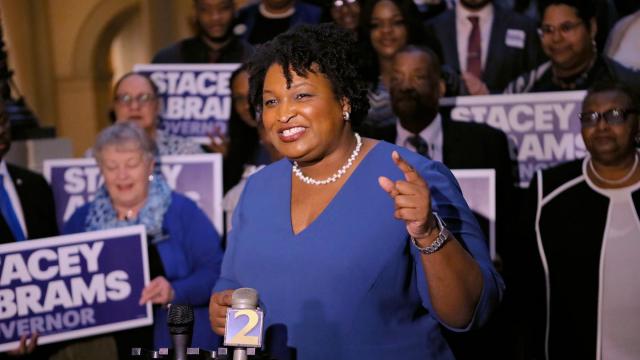
The governor’s race in Georgia is already one of the most closely watched in the nation, as a potential harbinger of the expected “blue wave” in 2018. Democrats haven’t held the office since Roy Barnes lost it in 2002, and winning it back is still a long shot. But the race remains notable for a couple of reasons. The first is history. Over the course of the state’s 242 years since the Declaration of Independence, all 81 of its governors have been white men. This year, the Republican candidate for the open seat will be yet another white man, almost surely Lieutenant Governor Casey Cagle. Nothing about this monopoly by race and gender is unique, certainly not in the South. What’s special in Georgia is that both Democrats vying to challenge this year’s white man are women: Stacey Abrams and Stacey Evans. In fact, it may turn out that 2018 is only tangentially a year of Democrats rising, and primarily a year of women persisting.
In any case, Georgia’s Democrats vote on May 22, and both the polls and the early-voting pattern suggest Abrams will win. That shouldn’t be surprising: She was the minority leader in the State House of Representatives for the better part of a decade, has an impressive history working for voter registration, and has proved to be a strong fund-raiser. Indeed, Abrams is the far better candidate by every fundamental measure save one: She’s not white. Abrams would be the first black woman to serve as a state governor in US history, and that fact means she had to challenge the party’s conventional wisdom on Southern politics.
From the start, Abrams was dogged by the insinuation that she can’t win in the general election. Even if this is true, it’s a silly point, given that no Democrat stands a terribly good chance at winning statewide in Georgia at the moment. Which actually points to the second notable thing about the race: Abrams is trying to rewrite the rules of Southern—or at least Georgian—politics, by making the electorate more closely reflect society at large. If she succeeds, she’ll teach progressives much about the future of American politics.
Political operatives like to talk math, and rightly so: Democracy boils down to a tally. My Nation colleague Joan Walsh has done some of the math already with her profile of Abrams in June 2017, but it bears repeating. As Abrams tells it, there are two schools of thought on Georgia for Democrats. The first, the old school, centers white power and is definitionally conservative, in that it holds tight to an outdated idea. Its heyday was arguably Bill Clinton’s Blue Dog reign, during which Democrats still took up to 40 percent of the white vote, at a time when white voters were more than 70 percent of the electorate. Combined with a strong share of black voters—who were about a quarter of the electorate, and were left to choose between a conservative Democrat and an openly racist Republican—this was enough for the Democrats to win consistently statewide.
This, essentially, is Evans’s campaign. It was Jon Ossoff’s as well, and Michelle Nunn’s and Jason Carter’s before them. Note the trend here: Every one of these candidates lost, despite all the hoopla about their potential to bring whites back to the Democratic fold in the South. As one operative put it, there’s something about the definition of insanity in this pattern.
The old-school math no longer adds up because Southern white people have grown steadily more uncomfortable with a pluralistic society. Republican demagogues have channeled that discomfort into racist populism—anti-immigrant, pro-greed, and resentful of the social safety net, all of which are proxy wars in the fight over a more diverse slicing of the American pie of opportunity. A sectional party not far off from the Confederacy has emerged on the right.
Meanwhile, white voters have also become less pivotal. And that’s the new-school math.
Barack Obama changed things. His 2008 run drove black Georgians up to 30 percent of the electorate, a huge shift that has been lasting, even in the midterms. Meanwhile, the number of Latinos, Asian Americans, and others who don’t identify as white has skyrocketed, from just over 3 percent of voters in 2004 to 11.5 percent in 2016. All of this adds up to a rapid decline in white voting power at the Georgia ballot box. By 2016, white voters were down to 60 percent of the electorate, matching their share of the population.
The trend lines will continue in these directions, because Obama wasn’t the only force for change. Black Americans, Latinos, and young whites have been pouring into the state, fueling Georgia’s population rise and its economic growth. So Abrams’s argument is basically this: Run more candidates like Obama and you’ll reach more new voters. Nor is this an argument for purely representational politics. Rather, it’s to say that a progressive political future in the South depends on turning out huge numbers of voters of color who already want to see that future, not chasing white voters who fear it.
Actually achieving the turnout needed to win is an expensive proposition—more like the money the Democrats spend in Virginia than what they’ve shelled out in the Deep South. It’ll demand more than mailers and TV ads; in Georgia, as in many other Southern states, you have to knock on doors and talk to people, which means traversing the spread-out rural areas beyond Atlanta. It will take a real investment—and “investment” is the right word for it. Abrams may not win in November; any Democrat will need an unprecedented turnout. But if you want a progressive majority in Georgia, or in any other so-called red state, you’ve got to do the work of building one.













